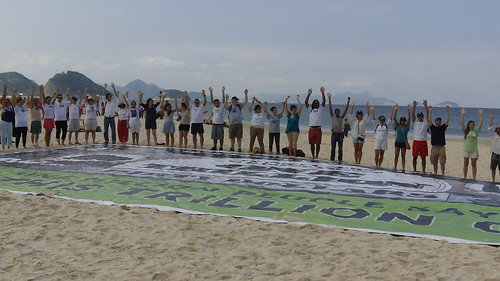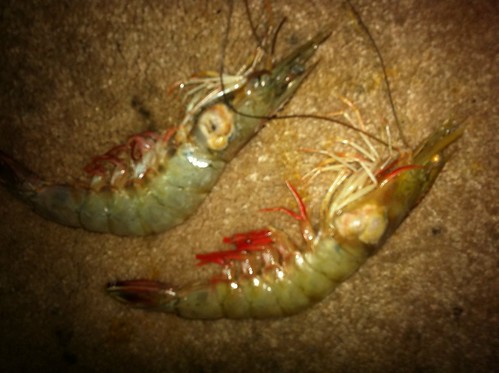Fossil Fuel Subsidies; the Answer Lies in the Gulf
This week, much of the globe’s attention is focused on the United Nation’s Rio +20 Earth Summit, where thousands of international delegates and NGO representatives are gathering to hammer out solutions to an increasingly stressed out, warmed-up world.
As the slow-burn of climate change spreads across the four corners of the globe, governments are fanning the global flames by dishing out a trillion dollars of fossil fuel subsidies each year, creating a perpetual pollution-pumping machine that's poisoning the planet with ever-greater intensity.
This needs to change if we’re going to pull out of the environmental death-spiral we’re zooming toward. As NRDC’s Jake Schmidt reports from Rio, the International Monetary Fund’s Christine Lagarde couldn't have said it better:
Many countries continue to subsidize polluting energy systems. These subsidies are costly for the budget and costly for the planet. Countries should reduce them. But in doing so, they must protect vulnerable groups by tightly focusing subsidies on products used by poorer people, and by strengthening social safety nets.
NRDC and a variety of NGOs are demanding that world leaders stop coddling the fossil fuel industry and focus instead on promoting rapidly developing clean energy technologies to protect our natural resources and maintain a sustainable planet. As Jake Schmidt put it, it’s not rocket science. But there are powerful special interests standing in the way.

Anti-fossil fuel subsidy banner in Rio this week. Photo: NRDC
You don’t have to go to Brazil to find out why this polluter payoff system has tragic consequences. We’ve got exhibit A right here in the good ole USA, where oil companies spend millions lobbying Congress and get billions in subsidies in return. It’s a fossil fuel free-for-all; Big Oil keeps its tax breaks while it drills its way to record profits. This week, NRDC and other environmental groups sued the Obama Administration to stop the planned sale of new oil leases in the deepwater Gulf, a reckless plan that ignores ongoing safety issues associated with drilling at even more dangerous depths, as NRDC’s David Pettit has blogged.
Just talk to the fishermen in the Gulf about their faith in the oil companies these days. Seafood king Dean Blanchard of Grand Isle, LA, was once one of the most successful shrimp buyers on the coast. But that all changed in BP’s fiery explosion two years ago. Now his business is in tatters, ruined he says by the millions of gallons of oil and chemical dispersant that flooded into local waters and straight into Barataria Bay, one of the most productive commercial shrimping grounds in the country.
But no longer. This year Blanchard says his once robust shrimp catch is down by about 50 percent, and he doesn’t expect it to get better anytime soon. In fact he bets it will get worse as the oil and dispersant mix works its way up the food chain, potentially wrecking havoc on future generations of seafood—threatening his fishing community's very survival.

Shrimp with growths caught in the Mississippi Sound, June, 2012.

Fish with lesions caught this year near Grand Isle, LA.
“Oil’s still coming in everyday out here, people are sick in the community, the fishing is getting worse….there’s deformed shrimp everywhere,” Blanchard says. “The oil companies have bought off all the politicians. I’m praying for a hurricane so it will stir up all the oil off the bottom and dump it on the Governor’s mansion. Then let’s see how he likes it.”
Other fishermen confirm catches are down, and many say it's getting increasingly hard to make a living off the sea, while they say BP has done little to compensate them. A veteran Louisiana fisherman says he's caught shrimp recently with what appear to be tumor-like growths, weird deformities he's never seen before. He also says the shrimp are unusually small for this time of year, so small they fall through the nets. With the high price of gas, he given up trawling at a time when he normally is making good money. Like many fishermen in the Gulf, he has no idea what the future will hold.
“Everything was going so good before the spill,” he said. “We finally had the shrimp prices up and then wham, the oil hit. We can fix things after a hurricane, but seems like we can’t fix things after an oil spill like this.”
So as government representatives gather in Brazil to try to solve the globe’s pressing environmental problems, they should remember what's happened to the fishermen in the Gulf, people who are paying the ultimate price for our addiction to oil. They are now struggling to put food on the table and save their livelihoods, while oil companies push their pipelines into more dangerous deep-water canyons miles below the sea, their fossil fuel subsidies safe and secure.
